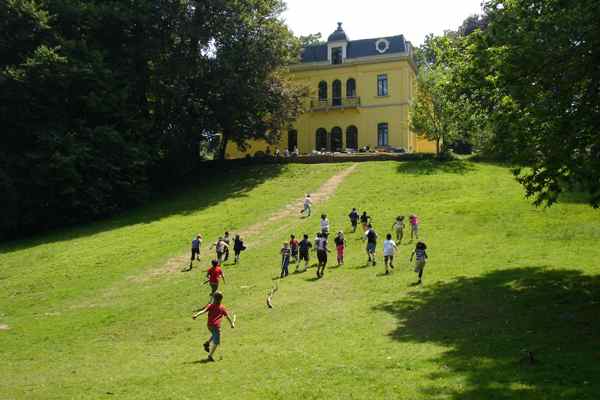
Let’s start with the safe claim that family dynamics are one of the most deeply felt parts of anyone’s life. It’s biologically ingrained in us to not only need parents, but to want to need them, too. In her documentary, The Chilean Building (El Edificio de los Chilenos), Macarena Aguiló explores a microcosm of blood bonds and how this innate desire plays out when extraneous circumstances force parent-child relationships to take a new shape. What begins by seeming like an artful news story about the children of Chile’s 1970s revolutionaries ultimately amounts to a case study of a simple human truth: what any child wants and needs most is to feel loved by their parents.
When Augusto Pinochet coup-ed his way into becoming dictator of Chile in 1973, leftist groups formed to battle his oppressive ways. Imprisonments and disappearances spiked, and the fearful landscape quickly became no place for government dissenters to raise a family. Carefully and intelligently, a group of parents formed “Project Home,” which was a boarding house that began in France and later moved to Cuba. The goal was to have foster parents to create the same nurturing, loving environment that they were unable to provide. For over 60 Chilean children, including Aguiló, it was a safe haven to grow up in while their parents battled the dictatorship.
Chests full of letters, pictures and child artwork kept by some of the now grown foster children coalesce into a montage of original sources, recreating the environment of the home: dark-skinned toddlers arriving in the Gare du Nord, communal bedrooms strewn with small clothes, boys playing foosball in their underwear, former only-children running through forests with their flocks of new siblings, foster parents sweeping them into their arms. For a while, it’s joyous. When you’re very young and have endless playtime and playmates, there’s no need to acknowledge the sadness of the underlying circumstances.
As the children come of age though, so does the film. Approximately halfway through, Aguiló shifts focus from the Neverland-like oasis to the inevitable feelings of, essentially, abandonment. The dichotomy of playing carefree on the beach in Cuba and then coming home to watch hoards of Chileans getting gassed by police on video tapes sent by their parents is a lot for anyone—let alone an eight-year-old—to internalize. In one interview, a foster mom describes the heartbreak of having to look in the eyes of boys and girls and tell them that their mom or dad had been killed. Despite a distance spanning oceans and countries, when war is the raison-d’être, how much protection can an enclave actually offer? And when those being protected are at their most formative stages of development, can it protect the parts of them that are most vulnerable?
Aguiló manages to sit in on some painfully real present-day talks between a few of the children who eventually reunited with their parents. At times, it seems as if these are virgin conversations for the families—full of heavy pauses, quiet tears and blunt statements about feelings and decisions during those years. Everyone she interviews lives with different memories. Some resent, some forgive, and some seem to have harbored no feelings to begin with. Some felt very loved; some felt isolated and alone. But whether positive or negative, it’s clear that they’re all still experiencing the fallout, still picking up the pieces of not being with their parents during their youth. For the father who has to leave the scene mid-conversation to collect himself and tells Aguiló to “shut it off,” it raises the question: If not for Aguiló and her personal involvement, would some of these parents and children have ever confronted their issues?
Even though the first half of the film is a throwback to the freedom and optimistic bliss of childhood, by the end, it is clear just how much emotional taxation this created home asked of very young people. The film could have taken a different route—developed surface debates of whether the parents had a choice, if they could have done things differently or perhaps better. But though those questions definitely play into the starting point of the film, they’re not the ending. In fact, there is no ending, really, because for Aguiló, it’s not about finding answers to fix history. It’s about exploring the questions that involve the human heart.
Director: Macarena Aguiló
Writer: Macarena Aguiló & Susana Foxley
Starring: n/a
Release Date: Aug. 13, 2012